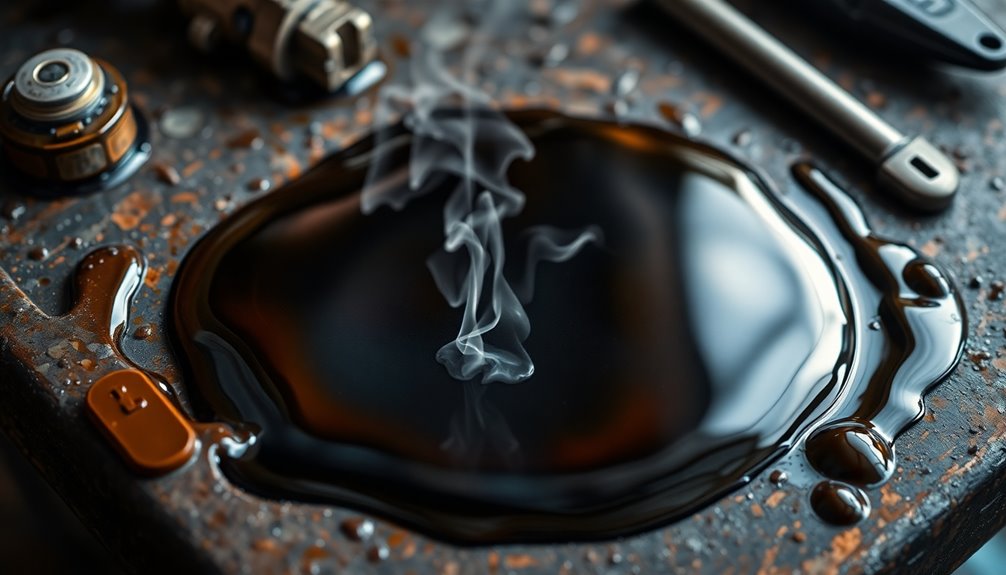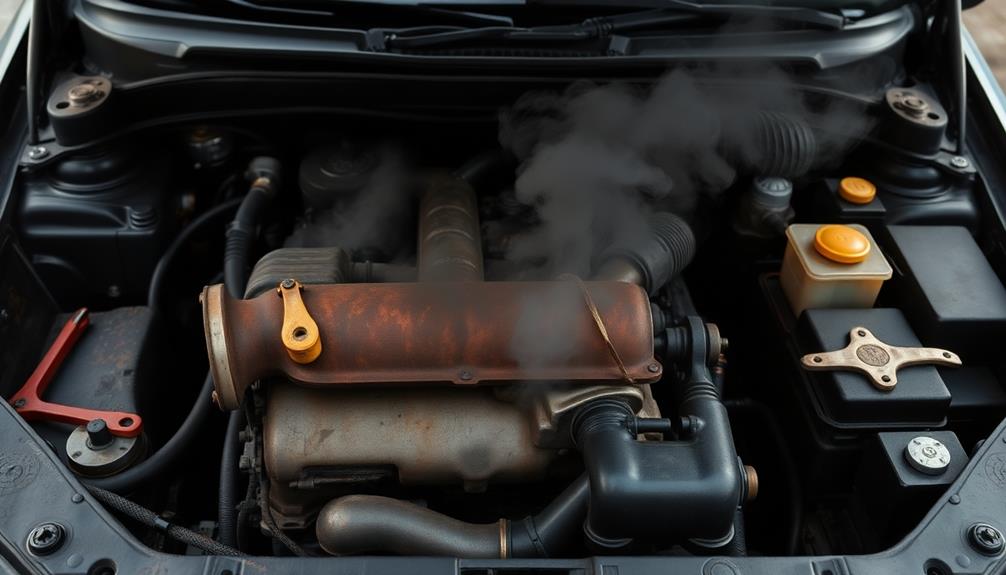Engine oil has a unique smell that can vary based on its condition. Fresh oil typically smells neutral with a hint of sweetness and slight chemical undertones. In contrast, used oil might emit a gassy odor, indicating fuel dilution or contamination. If the oil's been overheated or aged, it can develop a burnt scent. Synthetic oils have their own distinct aromas, often described as plastic-like. Keep an eye on any unusual smells, as they can signal engine issues. There's more to consider about oil smells and their implications, so keep exploring to stay informed.
Key Takeaways
- Fresh motor oil has a neutral aroma with a slight chemical undertone, often described as mild and slightly sweet.
- Synthetic oils emit a distinct plastic-like odor, while used oil can develop a gassy smell from fuel dilution or contamination.
- Aging oil emits unpleasant burnt odors due to overheating or breakdown, indicating potential engine issues.
- Unusual smells, like a sweet scent, may suggest coolant leaks into the oil, while a burnt smell signals overheating.
- Different brands have unique scents; for instance, Pennzoil has a corn-like scent, while Amsoil has a strong synthetic aroma.
Introduction

When you pop the hood of your car and take a whiff of the engine oil, you might be surprised by the variety of scents that greet you. Fresh engine oil generally has a neutral or slightly chemical smell, but synthetic blend oil can introduce an entirely different experience. Depending on the brand, you might notice a distinct plastic-like odor from synthetic oils.
As the oil ages or becomes contaminated, it can develop a gassy smell due to fuel dilution, signaling potential problems. You might even find that different brands produce unique scents; for example, Pennzoil has been noted for its corn-like aroma, while SLX (GC) oil could remind you of gummy bears.
The smell of synthetic blend oil varies, too, with some exhibiting a varnish-like fragrance and others carrying hints of gasoline. While you may rely on your sense of smell to evaluate your oil, remember that it's essential to conduct used oil analysis (UOAs) for a more accurate assessment of oil quality and contamination levels. This way, you can keep your engine running smoothly, regardless of the scent wafting up from under the hood.
Description of the Smell

Fresh motor oil typically presents a neutral aroma with a subtle chemical undertone, making it relatively inoffensive. You might notice that synthetic oils can have a distinct, plastic-like odor, setting them apart from conventional oils. When you encounter used motor oil, the scent changes; it can develop a gassy smell that often indicates fuel dilution, hinting at possible contamination.
Perceptions of oil smell can vary widely among individuals. Some people describe the odor as sweet, while others might find it reminiscent of gummy bears, depending on the brand. For instance, if you're using Pennzoil, you may catch a hint of corn-like scent, whereas Amsoil might remind you of a strong synthetic aroma.
If you ever detect a burning oil smell, it's crucial to address it promptly, as it could signal an issue with your engine. Remember, the color and odor of motor oil aren't always reliable indicators of its quality or contamination levels. Regular oil analysis is essential to ensure your engine stays in optimal condition.
Source and Composition

A variety of components make up engine oil, with base oils being the primary ingredient. These base oils can be either mineral, derived from crude oil, or synthetic, which are chemically engineered to enhance performance. When you're working with fresh motor oil, you'll notice it typically has a neutral or slightly chemical smell, characteristic of virgin oil. However, as the oil ages and collects contaminants, it can take on a more unpleasant scent, often resembling burnt oil due to overheating or fuel dilution.
Additives play a crucial role in defining the smell of engine oil. Ingredients like detergents and antioxidants not only improve the oil's performance but also influence its odor. For instance, synthetic oils often emit a plastic-like or varnish-like smell because of the specific chemicals used in their formulation. Different brands also contribute to unique scents; Pennzoil has a distinct corn-like aroma, while Amsoil is recognized for its robust synthetic odor. So, the next time you encounter engine oil, take a moment to consider its complex source and composition, which shape its distinct smell.
Typical Scenarios or Environments

Engine oil's odor can vary significantly depending on the scenario or environment in which it's encountered. When you're in a garage, for instance, fresh engine oil typically has a neutral or slightly chemical smell. If you're smelling oil from a freshly opened bottle, you might notice that synthetic oils emit a distinct plastic-like odor.
If you check the oil on the dipstick after some usage, you might catch a gassy smell, which often indicates fuel dilution. This can present itself as a strong gasoline odor, alerting you to potential issues. While different brands have their unique scents—like Pennzoil with its corn-like aroma or Amsoil's strong synthetic smell—your perception can also be influenced by personal sensitivity.
As oil begins to break down, its aroma can change, leading to reports of sweet or even gummy bear-like scents. So, whether you're changing your oil or simply curious, the environment and the state of the oil play crucial roles in the experience. Each scenario brings its own characteristics, making the world of engine oil smells quite diverse.
Emotional or Cultural Associations

During childhood, the smell of engine oil often brings back memories of weekends spent with family, bonding over car maintenance and learning the basics of vehicle care. For many, that distinct scent evokes nostalgia, reminding you of the oil changes that marked your growing independence and responsibility. You might recall the chatter of tools, the laughter, and the sense of accomplishment after a successful repair.
In car culture, this aroma isn't just an odor; it symbolizes reliability and safety, forming an emotional connection to the vehicles you cherish. Enthusiasts often romanticize the smell, linking it to a sense of pride in maintaining classic or performance cars. In certain communities, the scent signifies hard work and craftsmanship, reflecting values of stewardship and care for possessions.
Conversely, in other contexts, it might evoke thoughts of pollution and industrialization, showcasing how cultural perceptions can vary greatly. Regardless of associations, the smell of engine oil serves as a powerful reminder of life's moments—both significant and mundane—tied to the vehicles that shape our experiences.
Health or Safety Considerations

Memories tied to the smell of engine oil can be vivid, but it's important to recognize the health and safety implications associated with it. Fresh engine oil typically has a neutral or slightly chemical smell, but when used oil starts to smell like gas, that's a red flag. It indicates fuel dilution, which can lead to increased emissions and environmental hazards. Prolonged exposure to oil fumes, especially from burned oil, can cause respiratory issues and skin irritation, underlining the need for proper ventilation during maintenance.
If you detect an unusual burnt oil smell, it might signal overheating or engine damage, posing risks of engine failure and safety hazards while driving. Regularly checking your oil level and engaging in routine maintenance not only ensures your engine runs smoothly but also mitigates hazardous conditions from neglected oil quality. The importance of timely oil changes can't be overstated, as they play a crucial role in maintaining safety and performance. By staying proactive and attentive to these health or safety considerations, you can help protect yourself and your vehicle.
Final Thoughts

Understanding the nuances of engine oil smells can enhance your vehicle maintenance routine. Fresh motor oil typically has a neutral or slightly chemical smell, while synthetic oils often carry a distinct plastic-like odor. Being aware of these variations helps you identify potential engine issues early. If you notice a gassy smell in your oil, it could indicate fuel contamination, a problem that needs prompt attention.
Different brands can also present unique scents; for instance, some users describe Pennzoil as having a corn-like aroma. However, remember that oil smell perception can differ from person to person, influenced by individual sensitivity and psychological factors.
Regular oil changes are crucial for keeping your engine healthy. If you detect a thick, acrid odor, it may mean your oil is burnt, signaling an immediate need for maintenance. Ignoring these signs can lead to severe engine damage down the line.
Frequently Asked Questions
Does Engine Oil Have a Scent?
Yes, engine oil does have a scent. When you open a bottle of fresh motor oil, you'll notice a neutral or slightly chemical smell. If you're using synthetic oil, it might have a plastic-like odor. As the oil ages, it can develop a gassy smell, suggesting possible contamination. Remember, different brands can produce unique scents, so what you smell can vary. Regular checks and changes are key to maintaining your engine's health.
What Does Bad Engine Oil Smell Like?
When you notice bad engine oil, you'll often detect a burnt smell, which signals overheating and oil degradation. A strong gasoline odor may indicate fuel contamination, pointing to issues like leaking fuel injectors. If the oil smells acrid or gassy, it suggests improper combustion, needing your immediate attention. Finally, a sour or rancid scent could mean oxidation or moisture contamination, so keep an eye on those signs to maintain your engine's health.
What Does an Engine Smell Like?
When you think about an engine's smell, you might notice a mix of scents. A healthy engine often has a neutral, metallic scent, while overheating can create a burnt oil odor. If fuel's leaking, you might detect a gassy smell. Additionally, if there's oil leaking onto hot surfaces, it can produce a pungent, acrid aroma. Regularly checking these smells can help you catch potential issues early, ensuring your engine runs smoothly.
Does Oil Have a Smell?
Yes, oil does have a smell. Fresh oil often has a neutral or slightly chemical scent, while synthetic varieties can emit a plastic-like odor. As oil ages, the smell can change, potentially developing a gassy scent from fuel dilution. You might notice different brands have unique fragrances, too. However, don't rely solely on the smell to judge oil quality; regular oil analysis is a more reliable method for assessing its condition.









